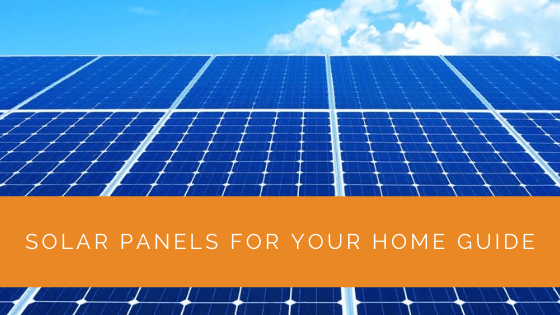Are you concerned about the impact of climate change on our planet? Do you want to make a difference and reduce your carbon footprint? Switching to solar power can be a game-changer. Not only does it help protect the environment, but it also saves you money in the long run.
In this comprehensive guide, we aim to provide you with all the essential information you need to make an informed decision about solar power. From the basics of solar panels to the types of components, their efficiency, and costs, we have you covered. We also delve into the financial options available for homeowners and businesses, as well as the advantages and disadvantages of solar power. Whether you’re a homeowner looking to make a positive impact or someone intrigued by generating your electricity, this guide is a must-read. So why wait? Let’s dive in and discover the world of solar power together.
Contents
- 1 Key Takeaways
- 2 Why Should You Have A Home Solar Panel System?
- 3 Are Solar Panels An Efficient Choice In The UK?
- 4 What Are The Different Types Of Solar Panels?
- 5 What Are The Main Components Of A Home Solar System?
- 6 How Much Do Home Solar Panels Cost?
- 7 Financial Options for Solar Panels
- 8 Advantages of Home Solar Panels
- 9 Disadvantages of Home Solar Panels
- 10 Things to Consider When Installing Home Solar Panels
- 11 How Can You Get Solar Panels in Your House?
- 12 Case Study: Residential Solar Panel Installation
- 13 Expert Insights From Our Solar Panel Installers About Home Solar Panels
- 14 Discover the Power of Solar with Solar Panels Network
- 15 Final Thoughts
Key Takeaways
- Installing a home solar panel system can reduce your carbon footprint, lower utility bills, and provide energy independence, offering significant advantages for homeowners.
- In the UK, solar panels are an efficient choice due to the climate, even in less sunny conditions, and the angle of the panels can maximise their efficiency.
- There are three main types of solar panels to consider: monocrystalline, polycrystalline, and amorphous, each with its characteristics and lifespan.
Why Should You Have A Home Solar Panel System?
Installing solar panels in your house can be a significant step towards improving the environment. You will be attaining energy independence and also decrease your utility bills. You will not have to depend on utility companies when you generate your electricity.
The rise of electricity costs has been creating problems for thousands of citizens. Hence, the dependency on solar power will help protect citizens against rising costs.
Solar energy is trapped in the solar panels, which help generate electricity for your household. Depending on the size of your house, you will need to look for the perfect solar panel system. You can power different electrical equipment at home without raising your costs.
Installing photovoltaic panels in your home will also help increase the value of your home to a great extent. In the UK, houses with solar panel systems have a higher resale value than those without.
Are Solar Panels An Efficient Choice In The UK?
Everyone knows that the climate in the UK is not always sunny. This can give rise to confusion and doubts regarding the efficiency of solar panels in the UK. However, it is worth noting that the weather in the UK is ideal for solar panel efficiency.
Solar panels work best on sunny days but do not always need direct sunlight. Solar panels can generate considerable energy, even during cloudy days or winter. Moreover, solar panels are ideal for cool weather since they can get overheated in extremely warm weather.
Solar panels will work efficiently as long as the panels are clear of snow. The albedo effect results in solar panels being highly efficient in snowy climates. This is because the whiteness of the snow will reflect the sunlight, which will help produce electricity.
Apart from the climate, the angle of the solar panels is also a crucial factor in deciding the efficiency. Most households in the UK have south-facing solar panels, which helps increase efficiency. It would be best to decide the correct angle to face the solar panels to get maximum sunlight.
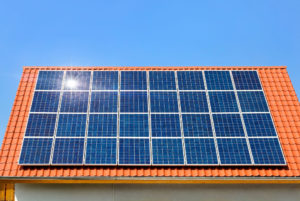
What Are The Different Types Of Solar Panels?
Before installing solar panels, you need to know the different types of solar panels in the market. Not all solar panels suit your house; you must decide which one will work best for you.
Each of the solar panels is made from silicon, which is a semiconductor. You can also consult your solar installer to know which solar panel will best suit your house. The three types of solar panels are as follows –
Monocrystalline Solar Panels
Monocrystalline solar panels are made from one large piece of silicon. They are highly efficient and are a compact panel system. These solar panels are costly and last 25 to 30 years.
Polycrystalline Solar Panels
Polycrystalline solar panels are made from multiple silicon panels. These solar panels are larger and less efficient than monocrystalline solar panels. However, they are much more affordable and would last for about 25 years.
Amorphous Solar Panels
Amorphous solar panels are made from thin silicon layers present on supporting materials like glass or plastic. They are the least efficient solar panels and also the largest. However, these solar panels can also be highly beneficial since they perform well in low sunlight. Amorphous solar panels will last for about ten years.
What Are The Main Components Of A Home Solar System?
The solar panel system in your home consists of several components. Other components are crucial for the system besides the obvious use of solar panels. Below are the components and the features present in your home solar system.
Solar Panels
One of the main components of the solar system is the solar panels. These panels are made from photovoltaic cells or PV cells. These cells absorb the sunlight and convert the light into DC or direct current electricity. An average-sized will require around 20 solar panels.
Mounting Racks
The solar panels will be placed on mounting racks. These mounting racks are of two types – adjustable and fixed. It is clear from the name that fixed racks are set at a fixed angle, while you can manipulate adjustable racks at different angles.
You can move the adjustable racks to face the sunlight when the sun changes its position. Homeowners can use these mounting racks to retrofit the solar panels on their roofs.
There is another option, which is solar shingles made by Tesla. You can use these to mount solar panels by replacing your existing roof and not retrofitting it.
Battery
The lithium-ion battery is an optional component that not all homeowners may opt for. A battery will help store the excess solar energy, which you can use during emergencies. Even though there are other battery options, lithium-ion batteries are the most common.
Inverter
An inverter is a large box that converts direct current (DC) into alternating (AC) electricity. An alternating current powers your house, and the conversion is necessary. Inverter sizes are measured in kilowatts, similar to solar panels. Hence, the size of your solar panels and inverter should correlate.
Physically, the inverter would be half the size of one panel, but the weight can be a couple hundred pounds. It is better to ask your solar installer about the right inverter size for your house.
How Much Do Home Solar Panels Cost?
UK solar panels can be anywhere between £350 and £500 per panel. However, the actual cost would vary depending on the type and size of the solar panel system. Ideally, most homeowners choose a 4 kW system that can cover about 29 sq. m. of your roof. This would cost you approximately £6,000.
Due to the advancements in solar systems, the cost of solar panels has significantly decreased. Below, we have mentioned a table that will give you an idea of the solar panel costs for your household.
It is essential to remember that these are approximate costs, and the actual cost might vary greatly.
| Solar Panel Size | Approx. Cost | No. Of Panels | Roof Area (sq. m.) |
|---|---|---|---|
| 3 kW | £5,000 - £6,000 | 12 | 22 |
| 4 kW | £6,000 - £8,000 | 16 | 29 |
| 5 kW | £7,000 - £9,000 | 20 | 32 |
| 6 kW | £8,000 - £10,000 | 24 | 43 |
The initial cost of installing a solar panel system is relatively high. It will go higher as the electricity generation capacity of your system goes up. However, in the long run, the savings for such systems will also be very high.
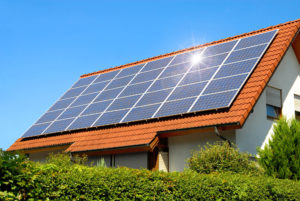
Financial Options for Solar Panels
You get several financing options for your solar system. The primary option is to pay upfront for the installation. However, there are a few other financial options that you can avail. Below are the financial options that you can use.
Upfront Payment
As mentioned, the primary option is to buy the complete system upfront. This can be a substantial financial burden for many people; however, owning the system will be financially beneficial for you.
Smart Export Guarantee (SEG)
SEG is a grant that was introduced on 1 January 2020. This is the only solar funding that you will find in the UK. This funding allows small-scale electricity generators that produce low carbon to get payments for the extra energy they send back to the grid.
The grant is not directly government but is given by licensed suppliers. These suppliers need to provide export tariffs to their customers. Homeowners with a regular solar system up to a capacity of 5 MW will be eligible for the SEG.
Reduced VAT
According to the new system of VAT pricing, solar panels can avail of a tax reduction of up to 5%. People above 60 and those who receive income or disability benefits will be eligible for this tax reduction.
Feed-In Tariff (FIT)
The FIT was started in 2010 and was successful until 2019, when the scheme stopped taking new applications. However, people still registered under this tariff can enjoy the benefits. This scheme states that people who generate electricity using solar panels and wind turbines will be eligible for a payback amount.
The payback amount will be based on each kilowatt per hour produced and excess electricity sold back to the grid. FIT has no fixed amount, and it will vary depending on the technology type, installation time, and system size.
There will be two types of payments that a certified installer will tell you about. These are the Generation Tariff and Export Tariff. A generation tariff is given on the energy your solar panels produce and use. This ranged between 6.38 and 13.88 p per kWh/h.
On the other hand, an export tariff is given on the excess energy you sell, and you get 4.77 p per unit. You will not get the FIT in Northern Ireland.
Apart from the ones mentioned here, you may have other financial options. Your solar installer will guide you in this aspect and help you choose the right financial option.
Advantages of Home Solar Panels
A solar panel is a very beneficial investment and helps produce environment-friendly energy. The benefits of installing home solar panels are –
Decrease Electricity Bills
When household increases their dependency on electronic gadgets, there will be an increase in their utility bills. Moreover, the price of electricity is increasing day by day. You can reduce your utility bills by shifting to solar energy.
The solar panels produce free energy, which you can store for future use. You can also get incentives for the excess energy that solar panels produce.
Get Money Back
You can make money using the Smart Export Guarantee (SEG), which sells the excess energy back to the grid. Energy suppliers that have 150,000 or more customers will need to provide an export tariff to their customers. This tariff should be more than zero.
Homeowners with a maximum of 5 MW capacity will get money back on the solar panel investments. However, this is a fairly new grant, and previous homeowners may be registered under the feed-in tariff.
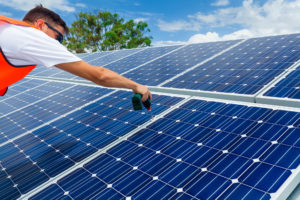
Reduction in Carbon Footprint
When you shift to renewable energy sources like solar power, you help reduce your carbon footprint. Traditional energy sources, like fossil fuels, oil, and coal, release carbon dioxide and other harmful pollutants into the air, which solar energy does not.
Low Maintenance
The best thing about solar panels is that they last 25 to 30 years and require little to no maintenance. You might need to change your inverter every 10 to 15, but no extravagant or tiresome maintenance is required. The only maintenance required is keeping the panels clean and having an installer inspect the system yearly.
Efficient All Year
Solar panels can function efficiently all year round, even during winter. They can also generate substantial energy during winter or cloudy days. During sunny days, you will get the optimal use of solar panels.
Grid Independence
Solar panels offer independence from the grid, which is especially beneficial for houses in remote areas. These systems provide effective energy solutions and are affordable. You can use solar batteries to store excess energy and use them during the night or in harsh weather conditions.
Disadvantages of Home Solar Panels
Despite having so many benefits, solar panels also have certain drawbacks. Knowing these disadvantages is essential before installing a solar panel system. The disadvantages are as follows –
Expensive Initial Cost
The initial costs of solar panels are very high. It can be around £5,000 to £10,000, which you must pay upfront. Even though financing options can help you earn your money back, the initial cost might be too much for some people.
Need Specific Placement
The placement of the solar panels needs to be right to get its complete efficiency. The efficiency could decrease if you have an odd-shaped roof or a shaded space or are surrounded by large trees or buildings. You need to ensure that there are no obstructions to getting direct sunlight.
High Efficiently During Daytime
Even though you can use solar energy at all times, solar panels work only in sunlight. The excess sunlight is stored in batteries or sent to the grid, then used at night or off-peak times.
Things to Consider When Installing Home Solar Panels
The number of solar panels and the cost of the system will depend on several factors. A professional solar installer can provide the right quote based on these factors. Below are the things or factors you must consider when installing a solar system in your house.
Solar Panel Dimensions
There are many sizes of solar panels, which is the first factor you need to decide on. The standard size of a home solar panel is approximately 65″ x 39″. This is a universal size, but there can be a difference in the measurements depending on which solar panel you choose.
Solar Panel Wattage
The wattage produced by each solar panel is different. Solar panels that produce higher wattage are costlier. It would be best to remember that even though most solar panels can last for about 25 years, their efficiency will decline with time.
Energy Consumption
The average energy consumption in most households is about 1000 kilowatts per month. You can look into your previous electricity bills and see how many monthly kilowatts your house consumes.
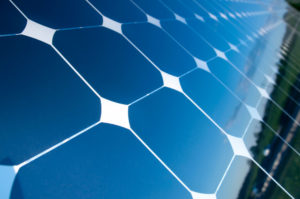
Storage Option
You can look into the battery storage option if you want energy stored during emergencies. Even though this is an optional criterion, several homeowners use energy during off-peak hours. If you choose a battery system, you can reduce the number of solar panels.
Roof Shape and Size
One of the main factors that installers will assess is the shape and size of your roof. If your roof has an odd or unique shape, it may be hard to install solar panels. Moreover, the space should not be shaded and should have direct exposure to sunlight.
Sunlight Exposure
As mentioned above, you can only install solar panels if your roof is exposed to sunlight. If there is a particularly shaded area or your roof does not get ample sunlight, the number of solar panels may increase.
From this, you can understand that it is hard to determine the number of solar panels you need for your house by yourself. You will need to depend on the expertise of a solar installer. They will consider these factors and provide you with the right plant to install a solar system in your house.
You should also know that roofs are not the only place to install solar panels. Many houses also have ground-mounted solar panels. However, these grounds must be open, spacious, and exposed to direct sunlight.
How Can You Get Solar Panels in Your House?
If you want to install a solar panel system in your house, there are certain steps you need to follow. Below are the necessary steps for getting a solar panel system.
The first thing you need to do is contact a solar expert. This solar expert will visit your house and look into the space. They will take the necessary measurements for the roof and see if the structural integrity of your roof and house is suitable for a solar system.
The solar expert will then provide you with all the suitable solar panel options. They will tell you about the types of panels, the number of panels, and their placement. These factors will depend on your requirements and need for the solar system.
Once you have decided on all the factors, the next step would be to get a cost estimate. The solar expert will provide you with an estimate, including labour and material costs. After this, you can schedule the time for the physical installation.
Physical installation can be done within a day or may take up to a week. This depends on the type of solar system you are installing and the size.
Case Study: Residential Solar Panel Installation
Background
A UK-based family approached Solar Panels Network to reduce their carbon footprint and achieve energy independence. They were also concerned about rising energy costs and wanted a sustainable, long-term solution.
Project Overview
Our team designed a solar panel system tailored to the family’s energy needs, considering their roof space, sunlight exposure, and budget. The project aimed to provide substantial electricity savings and reduce reliance on the national grid.
Implementation
- System Design and Selection:
- Conducted a detailed assessment of the property, including roof orientation and shading analysis.
- Recommended monocrystalline solar panels for their high efficiency and durability.
- Designed a 5 kW system with 18 panels, optimising for maximum sunlight exposure.
- Installation Process:
- Erected scaffolding to ensure safe access to the roof.
- Installed mounting racks and secured solar panels, ensuring optimal tilt and orientation.
- Connected panels to a high-efficiency inverter for converting DC to AC power.
- Integrated a lithium-ion battery for energy storage, providing backup during low sunlight periods.
- System Testing and Commissioning:
- Conducted rigorous testing to ensure the system’s efficiency and safety.
- Provided the family with a user-friendly monitoring system to track energy production and consumption.
Results
- Energy Production: The system generates approximately 6,000 kWh annually, covering about 75% of the household’s electricity needs.
- Cost Savings: The family experienced a 60% reduction in their electricity bills, with an expected payback period of 6 to 7 years.
- Environmental Impact: The installation has reduced the household’s carbon footprint by over 2,500 kg of CO2 annually.
- Increased Property Value: The solar panel system has increased the property’s market value, making it more attractive to potential buyers.
Summary
This project showcases the benefits of residential solar panel installations, including significant cost savings, environmental benefits, and increased property value. The use of high-efficiency monocrystalline panels and a lithium-ion battery system maximised energy production and storage, ensuring the household’s energy needs are met sustainably. Solar Panels Network’s expertise ensured a smooth and successful installation, highlighting the potential for homeowners to transition to renewable energy seamlessly.
Expert Insights From Our Solar Panel Installers About Home Solar Panels
Home solar panels are an excellent investment for reducing electricity costs and achieving energy independence. Choosing the right type and size of the system tailored to your energy needs is crucial.
Senior Solar Installation Specialist
Maximising the efficiency of your solar panels involves proper placement and regular maintenance. Ensuring your panels receive unobstructed sunlight will significantly enhance their performance.
Renewable Energy Consultant
The initial cost of solar panels can be offset by long-term savings and various financial incentives. It’s important to consider these factors and consult with professionals to make an informed decision.
Solar Energy Advisor
Discover the Power of Solar with Solar Panels Network
Are you navigating the world of solar installations? Look no further than Solar Panels Network, the UK’s trusted partner in harnessing the sun’s potential. Our dedication goes beyond just installations; we’re on a mission to transform how homeowners and businesses across the UK perceive and utilise energy. By choosing us, you’re reducing your carbon footprint and making a smart financial move that promises savings for years ahead. Contact us today and embark on your solar journey.
Final Thoughts
Solar panels may be expensive, but they are a very clean energy source. Even though the initial costs can be high, you will get your money’s worth quickly. Moreover, you can take loans on solar panel installations or avail of other financial options.
You must choose a certified installer who can install the solar panel system in your house. Moreover, the installer can guide you in selecting the right solar panels and financing options.
By installing solar panels, you will make the world a safer and cleaner space for future generations. Moreover, you will not have to worry about using depleting elements to produce energy.
About the Author
Solar Panels Network stands at the forefront of solar energy solutions, driven by a team of seasoned solar engineers and energy consultants. With over decades of experience in delivering high-quality solar installations and maintenance, we are committed to promoting sustainable energy through customer-centric, tailored solutions. Our articles reflect this commitment, crafted collaboratively by experts to provide accurate, up-to-date insights into solar technology, ensuring our readers are well-informed and empowered in their solar energy decisions.

